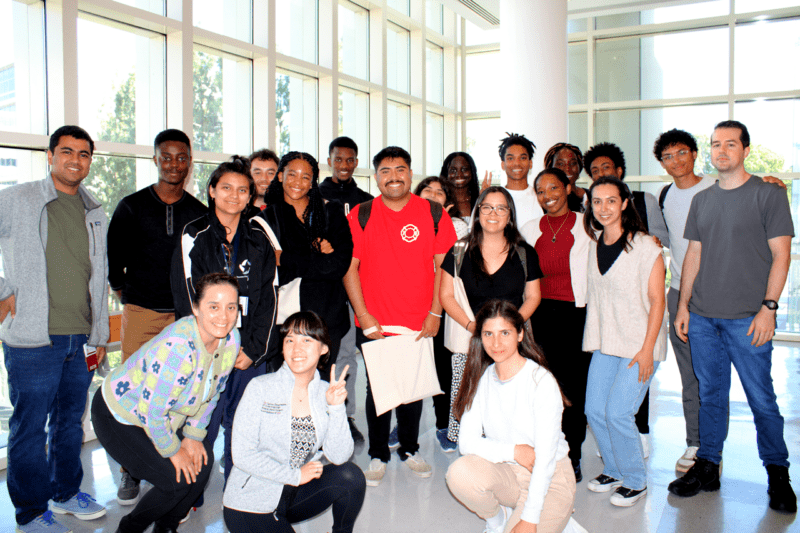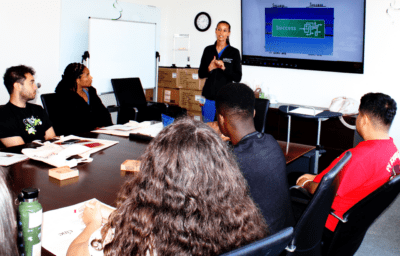By: Michelle Meyers

On Monday, June 26, 2023, the OHNS Diversity, Equity, and Inclusion Committee hosted 16 students from USC’s Bridging the Gaps Program (BTG) and Summer Program in Diabetes and Obesity Research (SPIDOR), at the HC4 Academic Offices and the Zilkha Neurogenetic Institute OHNS laboratories. (Photo Credit: Marlene Mendoza)
Dr. Tamara Chambers holds many impressive titles at the University of Southern California–Associate Professor of Clinical Otolaryngology-Head and Neck Surgery, Chief Medical Director for the LAC+USC Program, and Caruso Department of Otolaryngology-Head and Neck Surgery Diversity, Equity, and Inclusion Action Committee Co-Chair. But like everyone who achieves such great heights in the field of otolaryngology (or medicine more generally), Dr. Chambers has an origin story, one that was essential in leading her to become as engaged with issues of diversity, equity, and inclusion for minority students in the communities surrounding USC as she has been with her pursuits as a surgeon and researcher. Chambers approaches these communities not as an outsider but as someone intimately familiar with their complexities as Dr. Chambers herself grew up in South Central Los Angeles and attended Francisco Bravo Medical Magnet High School in Lincoln Heights, which focuses on serving students who plan to study in the healthcare field.
From the age of five, Tamara Chambers knew she wanted to become a physician, explaining: “I grew up around a lot of trauma and trauma situations. Gunshots were always an imminent danger, and a lot of people didn’t believe they would live past high school. There was the constant fear of things that would be inflicted upon you.” Though Chambers was highly motivated and driven, part of what enabled Dr. Chambers’ ambitions to be fully realized were the opportunities she received as a student at Bravo. For instance, as just a junior in high school, she was able to do head and neck research at USC’s Center for Craniofacial Molecular Biology, and after graduating from Bravo, Chambers went on to attend Stanford University and then the Charles Drew/UCLA Medical Education Program. Still, Chambers noted that as she did her rotations, she wasn’t really sure that there was a home for her in medicine, and as a female African-American medical student, it was difficult to find mentorship from someone who looked like her or who could understand her experiences. Moreover, Chambers also became aware of the fact that one of the challenges in finding what “clicked” for her was the brevity of exposure to certain topic areas–for example, during rotations, there was only a one-week focus on otolaryngology.
As the co-chair of OHNS’s DEI Action Committee with Dr. Daniel Kwon, Dr. Chambers is working toward changing this narrative by creating more opportunities for minority students, including through the OHNS DEI Summer Outreach Day that just passed on June 26, 2023. The OHNS DEI Summer Outreach Day was part of the Keck School of Medicine’s Bridging the Gaps Summer Research Program, which provides opportunities to outstanding underrepresented students to gain meaningful exposure to the exceptional research and clinical programs at the Keck School of Medicine. Dr. Chambers, along with her colleague Dr. Kwon and her colleague Marlene Mendoza (Program Manager of the Master of Science in Speech-Language Pathology Program at USC), approached the Bridging the Gaps program to see if they would be willing to host a day showcasing otolaryngology, as Dr. Chambers knew the potential impact of such exposure at a young age from her own experiences participating in several similar programs in high school and college.
Through Chambers, Kwon, and Mendoza’s collaborative efforts, the OHNS DEI Summer Outreach Day was able to feature a facial plating workshop on drilling and plate bending as well as a workshop in which students were able to practice removal and retrieval of foreign bodies from the larynx and flexible laryngoscopy with a scope on a model. In addition, Dr. Chambers and her team arranged for a renowned physician from Children’s Hospital Los Angeles to give a talk on microtia, or surgical reconstruction of the ear for congenital abnormalities, and representatives from USC’s Master of Science in Speech-Language Pathology gave a presentation on their program. Finally, students had the opportunity to tour the otolaryngology department’s research lab to get a glimpse of what they do up close.
Beyond providing opportunities for young, deserving individuals in under-resourced communities, Dr. Chambers contends that there are a variety of advantages to having greater diversity and equity of experience and backgrounds in the field of otolaryngology more specifically and in the field of medicine more broadly. “We know that healthcare outcomes improve,” Chambers said, “when folks look like the people they are serving, when they are representative of that community and are able to use their understanding of the context and culture of that community to meet patients where they are. Having different voices in the room changes the landscape of the way we’re able to deliver healthcare, and given that America is indeed a melting pot, we should be reflective of the communities in which we serve.” In creating the OHNS DEI Action Committee in September 2021, Chambers and co-chair Kwon were able to formalize some of the work that the Caruso Department of Otolaryngology was already doing. The committee supports three different arms–Oto Talks, Oto Gives, and Oto Teaches–with Chambers focusing on Oto Teaches as a way to try to build pipeline programs from Bravo Medical Magnet by hosting numerous outreach activities on their campus. Chambers hopes to both enrich students with those experiences and prepare them academically for a career in the healthcare field, and one of her eventual goals is to apply for additional funding so that she can get students into labs to do otolaryngology research over the summer as they currently are able to do with opportunities like SPIDER (the Summer Program in Diabetes & Obesity Research) at Keck.
Beyond Chambers’ work on the OHNS DEI Action Committee, she also serves as the Chief Medical Director for LAC+USC, the Co-Chair for the Residency Program, and the Chair of the SAFE Committee, which aims to address student concerns about sexual assault, harassment, and discrimination. As far as Chambers is concerned, all of these different roles tie together in their goal to create inclusivity for the voices of the traditionally voiceless. Given historic norms, residents fall uniquely into that category, and Chambers argues that they have a right to feel validated and to feel that they are being valued as part of the community, as she ultimately believes that when people work in a safe and equitable environment, they are encouraged to be the best versions of themselves and to keep the door open for others to follow in their footsteps. For clinicians who may be interested in becoming more involved in issues of diversity, equity, and inclusion (at USC or elsewhere), Chambers recommends the following: “Start with yourself and think about who you would have wanted to see when you were in that early phase of your journey and then work to create it. Knock on doors, ask questions, and go speak to students…there are also resources for funding and people already doing this on a smaller scale, so consider seeking out opportunities for collaboration. These are the steps we need to take toward changing the way that healthcare is delivered and to positively impact healthcare outcomes/disparities.”

